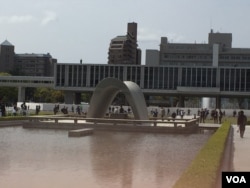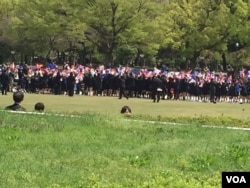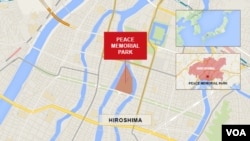U.S. Secretary of State John Kerry says he is “deeply moved" and "honored” to be the first U.S. Secretary of State to visit Hiroshima, Japan, a city devastated after the U.S. dropped an atomic bomb near the end of World War II.
He commented at the end of a two-day meeting with other Group of Seven (G7) foreign ministers that included a tour of a World War II memorial to victims in Hiroshima.
“It was a stunning display,” said Kerry, after visiting Hiroshima Peace Memorial Park. “It is a gut-wrenching display. It tugs at your sensibilities as a human being, he added.”
Asked if President Obama will visit Hiroshima when he attends a G-7 leaders’ summit in Japan in May, Kerry said he hoped that one day the president of the U.S. would be among those who visited the city.
He added that Obama had expressed an interest in visiting but did not know if the president’s schedule would permit during his upcoming trip to Japan.
An overriding theme during the sessions was nuclear non-proliferation and disarmament.
Japanese Foreign Minister Fumio Kishida was asked about recent comments made by U.S. Republican presidential candidate Donald Trump, who suggested Japan and South Korea should have nuclear weapons in order to decrease their reliance on the U.S. for protection.
“For us to obtain nuclear weapons is completely inconceivable,” said the foreign minister.
Later, without specifically mentioning Trump, Kerry said such suggestions by candidates for high office were “absurd on their face” and ran “counter to everything” the U.S. has been trying to achieve.
Global security was among the focal points for Kerry and foreign ministers during their two-day meeting, which comes on the heels of recent terrorist attacks in Brussels and Paris.
In a joint communiqué, foreign ministers condemned the attacks and other atrocities committed terrorist groups.
“Blatant abuses of human rights and the destruction and disorder being brought by ISIL/Daesh and other terrorist organizations continue to pose a serious threat to local, national, regional and international peace and security,” the group said.
The foreign ministers also weighed in on efforts to stabilize Syria through U.N.-facilitated talks on a political transition.
“It is vital that all parties to the Cessation, as well as their backers, continue to observe its terms fully and focus negotiations on political transition away from [Syrian President Bashar al-] Assad’s rule,” the group said.
The foreign ministers also discussed North Korea’s recent provocations, including its nuclear and ballistic missile tests.
Kerry traveled to Hiroshima from Afghanistan. His week-long tour has also included stops in Iraq and Bahrain.
On Tuesday, he will address a trade group in California. The State Department says he will address "national security opportunities" of the Trans-Pacific Partnership (TPP).







